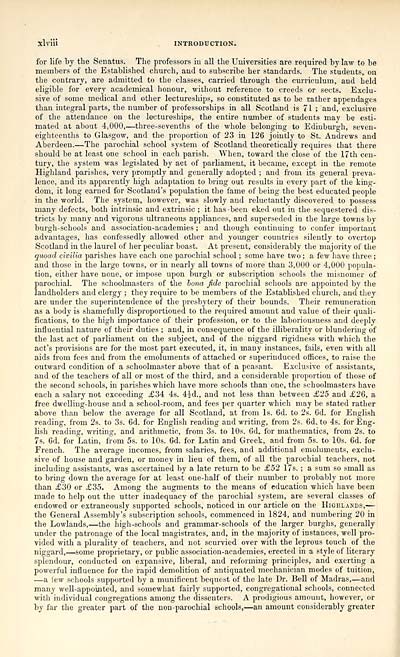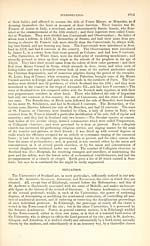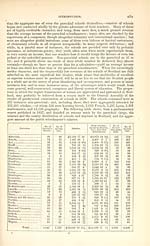Topographical, statistical, and historical gazetteer of Scotland > Volume 1
(60) Page xlviii
Download files
Complete book:
Individual page:
Thumbnail gallery: Grid view | List view

Xlvili INTRODUCTION.
for life by the Senatus. The professors in all the Universities are required by law to be
members of the Established church, and to subscribe her standards. The students, on
the contrary, are admitted to the classes,, carried through the curriculum, and held
eligible for every academical honour, without reference to creeds or sects. Exclu-
sive of some medical and other lectureships, so constituted as to be rather appendages
than integral parts, the number of professorships in all Scotland is 71 ;. and, exclusive
of the attendance on the lectureships,, the entire number of students may be esti-
mated at about 4,000, — three-sevenths of the whole belonging to Edinburgh, seven-
eighteenths to Glasgow, and the proportion of 23 in 126 jointly to St. Andrews and
Aberdeen. — The parochial school system of Scotland theoretically requires that there
should be at least one school in each parish. When, toward the close of the 17th cen-
tury, the system was legislated by act of parliament, it became, except in the remote
Highland parishes, very promptly and generally adopted ; and from its general preva-
lence, and its apparently high adaptation to bring out results in every part of the king-
dom, it long earned for Scotland's population the fame of being the best educated people
in the world. The system, however, was slowly and reluctantly discovered to possess
many defects, both intrinsic and extrinsic ; it has been eked out in the sequestered dis-
tricts by many and vigorous ultraneous appliances, and superseded in the large towns by
burgh-schools and association-academies ; and though continuing to confer important
advantages, has confessedly allowed other and younger countries silently to overtop
Scotland in the laurel of her peculiar boast. At present, considerably the majority of the
quoad civilia parishes have each one parochial school ; some have two ; a few have three ;
and those in the large towns, or in nearly all towns of more than 3,000 or 4,000 popula-
tion, either have none, or impose upon burgh or subscription schools the misnomer of
parochial. The schoolmasters of the bona fide parochial schools are appointed by the
landholders and clergy ; they require to be members of the Established church, and they
are under the superintendence of the presbytery of their bounds. Their remuneration
as a body is shamefully disproportioned to the required amount and value of their quali-
fications, to the high importance of their profession, or to the laboriousness and deeply
influential nature of their duties ; and, in consequence of the illiberality or blundering of
the last act of parliament on the subject, and of the niggard rigidness with which the
act's provisions are for the most part executed, it, in many instances, fails, even with all
aids from fees and from the emoluments of attached or superinduced offices, to raise the
outward condition of a schoolmaster above that of a peasant. Exclusive of assistants,
and of the teachers of all or most of the third, and a considerable proportion of those of
the second schools, in parishes which have more schools than one, the schoolmasters have
each a salary not exceeding £34 4s. 4£d-, and not less than between £25 and £26, a
free dwelling-house and a school-room, and fees per quarter which may be stated rather
above than below the average for all Scotland, at from Is. 6d. to 2s. 6d. for English
reading, from 2s. to 3s. 6d. for English reading and writing, from 2s. 6d. to 4s. for Eng-
lish reading, writing, and arithmetic, from 3s. to 10s. 6d. for mathematics, from 2s. to
7s. 6d. for Latin, from 5s. to 10s. 6d. for Latin and Greek, and from 5s. to 10s. 6d. for
French. The average incomes, from salaries, fees, and additional emoluments, exclu-
sive of house and garden, or money in lieu of them, of all the parochial teachers, not
including assistants, was ascertained by a late return to be £52 17s. ; a sum so small as
to bring down the average for at least one-half of their number to probably not more
than £30 or £35. Among the augments to the means of education which have been
made to help out the utter inadequacy of the parochial system, are several classes of
endowed or extraneously supported schools, noticed in our article on the Highlands, —
the General Assembly's subscription schools, commenced in 1824, and numbering 20 in
the Lowlands, — the high-schools and grammar-schools of the larger burghs, generally
under the patronage of the local magistrates, and, in the majority of instances, well pro-
vided with a plurality of teachers, and not scurvied over with the leprous touch of the
niggard, — some proprietary, or public association-academies, erected in a style of literary
splendour, conducted on expansive, liberal, and reforming principles, and exerting a
powerful influence for the rapid demolition of antiquated mechanician modes of tuition,
— a lew schools supported by a munificent bequest of the late Dr. Bell of Madras, — and
many well-appointed, and somewhat fairly supported, congregational schools, connected
with individual congregations among the dissenters. A prodigious amount, however, or
by far the greater part of the non-parochial schools, — an amount considerably greater
for life by the Senatus. The professors in all the Universities are required by law to be
members of the Established church, and to subscribe her standards. The students, on
the contrary, are admitted to the classes,, carried through the curriculum, and held
eligible for every academical honour, without reference to creeds or sects. Exclu-
sive of some medical and other lectureships, so constituted as to be rather appendages
than integral parts, the number of professorships in all Scotland is 71 ;. and, exclusive
of the attendance on the lectureships,, the entire number of students may be esti-
mated at about 4,000, — three-sevenths of the whole belonging to Edinburgh, seven-
eighteenths to Glasgow, and the proportion of 23 in 126 jointly to St. Andrews and
Aberdeen. — The parochial school system of Scotland theoretically requires that there
should be at least one school in each parish. When, toward the close of the 17th cen-
tury, the system was legislated by act of parliament, it became, except in the remote
Highland parishes, very promptly and generally adopted ; and from its general preva-
lence, and its apparently high adaptation to bring out results in every part of the king-
dom, it long earned for Scotland's population the fame of being the best educated people
in the world. The system, however, was slowly and reluctantly discovered to possess
many defects, both intrinsic and extrinsic ; it has been eked out in the sequestered dis-
tricts by many and vigorous ultraneous appliances, and superseded in the large towns by
burgh-schools and association-academies ; and though continuing to confer important
advantages, has confessedly allowed other and younger countries silently to overtop
Scotland in the laurel of her peculiar boast. At present, considerably the majority of the
quoad civilia parishes have each one parochial school ; some have two ; a few have three ;
and those in the large towns, or in nearly all towns of more than 3,000 or 4,000 popula-
tion, either have none, or impose upon burgh or subscription schools the misnomer of
parochial. The schoolmasters of the bona fide parochial schools are appointed by the
landholders and clergy ; they require to be members of the Established church, and they
are under the superintendence of the presbytery of their bounds. Their remuneration
as a body is shamefully disproportioned to the required amount and value of their quali-
fications, to the high importance of their profession, or to the laboriousness and deeply
influential nature of their duties ; and, in consequence of the illiberality or blundering of
the last act of parliament on the subject, and of the niggard rigidness with which the
act's provisions are for the most part executed, it, in many instances, fails, even with all
aids from fees and from the emoluments of attached or superinduced offices, to raise the
outward condition of a schoolmaster above that of a peasant. Exclusive of assistants,
and of the teachers of all or most of the third, and a considerable proportion of those of
the second schools, in parishes which have more schools than one, the schoolmasters have
each a salary not exceeding £34 4s. 4£d-, and not less than between £25 and £26, a
free dwelling-house and a school-room, and fees per quarter which may be stated rather
above than below the average for all Scotland, at from Is. 6d. to 2s. 6d. for English
reading, from 2s. to 3s. 6d. for English reading and writing, from 2s. 6d. to 4s. for Eng-
lish reading, writing, and arithmetic, from 3s. to 10s. 6d. for mathematics, from 2s. to
7s. 6d. for Latin, from 5s. to 10s. 6d. for Latin and Greek, and from 5s. to 10s. 6d. for
French. The average incomes, from salaries, fees, and additional emoluments, exclu-
sive of house and garden, or money in lieu of them, of all the parochial teachers, not
including assistants, was ascertained by a late return to be £52 17s. ; a sum so small as
to bring down the average for at least one-half of their number to probably not more
than £30 or £35. Among the augments to the means of education which have been
made to help out the utter inadequacy of the parochial system, are several classes of
endowed or extraneously supported schools, noticed in our article on the Highlands, —
the General Assembly's subscription schools, commenced in 1824, and numbering 20 in
the Lowlands, — the high-schools and grammar-schools of the larger burghs, generally
under the patronage of the local magistrates, and, in the majority of instances, well pro-
vided with a plurality of teachers, and not scurvied over with the leprous touch of the
niggard, — some proprietary, or public association-academies, erected in a style of literary
splendour, conducted on expansive, liberal, and reforming principles, and exerting a
powerful influence for the rapid demolition of antiquated mechanician modes of tuition,
— a lew schools supported by a munificent bequest of the late Dr. Bell of Madras, — and
many well-appointed, and somewhat fairly supported, congregational schools, connected
with individual congregations among the dissenters. A prodigious amount, however, or
by far the greater part of the non-parochial schools, — an amount considerably greater
Set display mode to: Large image | Transcription
Images and transcriptions on this page, including medium image downloads, may be used under the Creative Commons Attribution 4.0 International Licence unless otherwise stated. ![]()
| Gazetteers of Scotland, 1803-1901 > Topographical, statistical, and historical gazetteer of Scotland > Volume 1 > (60) Page xlviii |
|---|
| Permanent URL | https://digital.nls.uk/97438266 |
|---|
| Description | Volume first. A-H. |
|---|---|
| Attribution and copyright: |
|

